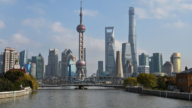【新唐人2014年12月12日讯】近来,中国大陆股市如同坐上“云霄飞车”,在经历了一段“疯狂之旅”后,本周二突然“大跳水”,跌幅达到2009年以来最大。那么各界聚焦并探讨中国股市暴跌原因,虽然说法不一,但不少分析都认为,对于股民而言,风险是实实在在的。
过去一个月,受到中共央行意外减息等因素影响,中国股市开始加速上涨。11月底,A股市值甚至超越日本,仅次于美国,名列世界第二。
12月2号,国际评级机构标准普尔对中国银行业风险发布警告,但当天上海和深圳股市大涨,其中银行股涨幅达6.27%。
本周一,沪指更是突破3000点大关,这是2010年以来第一次。
“牛市”似乎不足以形容过去两周中国股市的疯狂,所以大陆媒体开始用“疯牛”来描述。
《人民日报》系列报导中,《新常态下这一年》,对于A股这波“牛市”,似乎也持欢迎态度。
北京“天则经济研究所”所长助理段绍译:“我觉得中国股市持续上涨的原因第一是因为老百姓没有投资的渠道;第二房市面临很不好的前景;第三就是很多中国的投资人多数是非理性的,他们不一定认为它值多少钱就投资多少钱,他是想:哎呀这么多年的股市都没有涨,应该要涨了,都是这么一种预期;第四就是对股市很多的是被操纵的,总的来说中国的股市是一个非理性的市场。”
仅仅一天后,中国股市在周二创下了近5年来的最大单日跌幅。截至收盘,沪指下跌5.43%,以2,856.27点报收。深圳证券交易所的基准指数也下跌,收盘时跌幅达4.2%。
外界分析,造成这次股市暴跌的导火索,和中国证券登记结算公司8号发布的一项通知有关,该通知涉及企业债券回购资格申请的最低要求提高等变更,使得外界担忧机构流动性压力可能增大。
另一个因素,则是关于IPO发行可能会加速的猜测。
不少分析师们认为此番“杀跌”是技术性调整。虽然分析师们不愿轻易断言,周二的“杀跌”代表这一轮“牛市”的终结。但人们也开始探讨,这反映了中国经济基本面的风险。
台湾《自由时报》发出警告,中国企业的财务不透明,本益比偏高,充满诈骗,中国股市少碰为妙。
前腾讯财经频道编辑张贾龙:“长期来看,一个国家的股市其实就是国民经济的晴雨表,中国的经济基本面是不太好的,你的股市会有震荡的上涨,但是总体来说是往下啦。至少在中国共产党目前的这种经济体制下它应该就是这样。因为你从它的经济速度、技术、制度还有人力资源各个方面来看的话,它并没有太多取值。现在GDP的年增7.5%它都很难,股市不可能太好。”
《华尔街日报》10号刊文《中国股市周二大跌的五个原因》,其中提到,投资者对中国股市缺乏信心,许多散户投资者认为股市中充斥着内幕交易,同时新股发行的政府审核制也使得股市跛足前行。报导撷取了微博上网友一条颇具代表性的贴子说:“我不知道为什么会出现这么大的下跌,我也不知道为什么股市会上涨。这几乎没有任何的逻辑。”
北京“天则经济研究所”所长助理段绍译:“中国的股市是一个博彩市场,它不是一个真正的投资市场。真正的股市的价值来源于企业的价值,如果企业不赚钱股票上涨,这就是投机。企业赚了钱,股票赚了钱,这你就是投资。中国的股市一直有被操控因素。不只是现在,在过去、现在和将来很长时间,可能还是被操纵的。中国的股市是不代表经济的发展水平的。”
不过,中国经济数据的疲弱,还是让外界对未来的A股走势感到一些担忧。
根据中共海关最近公布的外贸数据显示,今年前11个月,中国进出口总值仅增长2.2%。11月份当月,中国进出口总值下降0.3%。低迷的外贸数据显示出经济的复苏前景不尽人意。
周三公布的11月CPI同比增长1.4%,更是创出了5年新低。
采访/秦雪 编辑/王子琦 后制/周天
Roller Coaster Ride Reflects Risk Behind China’s Stock Market
China’s stock market was on a roller coaster ride recently.
After going up crazily for some while, China’s stock indices
suddenly began to dive since Tuesday.
A record-sized slump since 2009 was recorded.
Many articles have been published to analyze
why such a sharp drop occurred.
There are different theories but most analysts agree that
the risk is real for investors in China’s market.
During the past month, China’s stock market rose fast.
This was believed to result from a surprising cut in interest
rates as well as other factors.
By the end of November, China’s A-share market value
exceeded that of Japan,.
This ranking was the second largest market in the workd
next to the United States.
On Dec.2, Standard & Poor’s issued a risk warning on
China’s banking industry.
On the same day, both Shanghai and Shenzhen composite
indices saw an unexpected sharp rise.
Bank shares also rose by as much as 6.27 percent.
This Monday, Shanghai composite index topped 3000
for the first time since 2010.
A “bull market” seems insufficient to describe China’s
white-hot stock market.
Some Chinese media introduced the term “mad bull”.
The People’s Daily published a series of reports titled
“A Year in New Normal States”.
The articles apparently show a welcome attitude toward
the “bull market” in A-share stocks.
Duan Shaoyi, director assistant of Beijing Unirule Institute of
Enonomy, ”Personally, I think the continuous rise in China’s
stock market essentially results from the fact that our people
have no other investment options.
Secondly, the real estate market currently has
no good prospects.
Thirdly, many Chinese investors are not rational.
The decisions may not be based on the real value of
what they invest.
Many people think like this: the stock market has not
been rising for a long time so probably it will rise soon.
Many Chinese simply prospect for things like that.
Finally, China’s stock market is frequently manipulated.
In general China’s equity market is an irrational one.”
The following day, China’s stock market suffered
the largest tumble in 5 years.
The Shanghai composite index closed at 2856.27,
dropping by 5.43 percent.
Shenzhen composite index also dropped by 4.2 percent
at the close.
Analysts said, the big selloff is related to an announcement
of China’s securities clearing house on Dec. 8.
The announcement said the threshold for corporate bonds
qualifying as collateral for repurchase agreements was raised.
This led to concern about increasing liquidity
pressure on financial institutions.
Another reason leading to the slump is the speculation
about potential acceleration of the pace of IPOs.
Many analysts believe that the selloff can be just a result
of technical adjustment.
Most of them still hesitate to assert that the slump will
end the “bull market”.
However, people begin to discuss the risks from most
fundamental aspects of China’s economy.
Taiwan-based Liberty Times warned that, Chinese firms
lack financial transparency, have high price-earnings ratios
and much more frequently make frauds. It is better not to
touch China’s equity market.
Zhang Jialong, former editor of Tencent Finance Channel,
“In the long-term view, equity market serves as a bellwether
of the state economy.
The basis of China’s economy is not looking good.
Therefore even if the stock market appears to rise
periodically, it should see an overall drop.
To say the least this should be case under the governance
of the Chinese Communist Party (CCP).
In reviewing economic growth, technical development, the
political system and human resources, there is not much
positive to say.
Currently maintaining a 7.5 percent GDP growth already has
become a difficult task for the CCP.
So the stock market prospect cannot be that good.”
On Dec.10, the Wall Street Journal published an article
titled “5 Reasons China’s Stocks are Tanking”.
The article said, investors lack confidence in China’s stock
market as it is “plagued by insider trading and hobbled
by state regulation of initial public offerings”.
The article quoted a typical comment on weibo, which says,
“I don’t know why this stuff dropped, and I don’t know why
it goes up either; there’s almost no logic.”
Duan Shaoyi, director assistant of Beijing Unirule Institute
of Enonomy, ”China’s stock market is more like a lottery
game than a place for investment. Real stock values should
be consistent with the value of its company.
If the company makes little money but its stock value is rising,
this can only be called speculation.
Investment means making dividends from holding shares.
In comparison, China’s stock market has always been
somehow manipulated.
This is true in the past, in the present, and probably
for a long time to come as well.
In a word, China’s stock market does not reflect
the state’s true economy.”
In the meantime, China’s weaker economic data
raises concerns over the future of A-shares.
According to the CCP’s latest official foreign trade statistics,
China’s imports and exports trade volumes only rose
by 2.2 percent in the first 11 months of 2014.
In November, imports and exports trade volumes dropped
by 0.3 percent, indicating a pessimistic prospect of China’s
economic recovery.
On Wednesday, the CCP officially announced November’s
CPI increased by 1.4 percent on an annual basis, hitting a
record-low in five years.

























